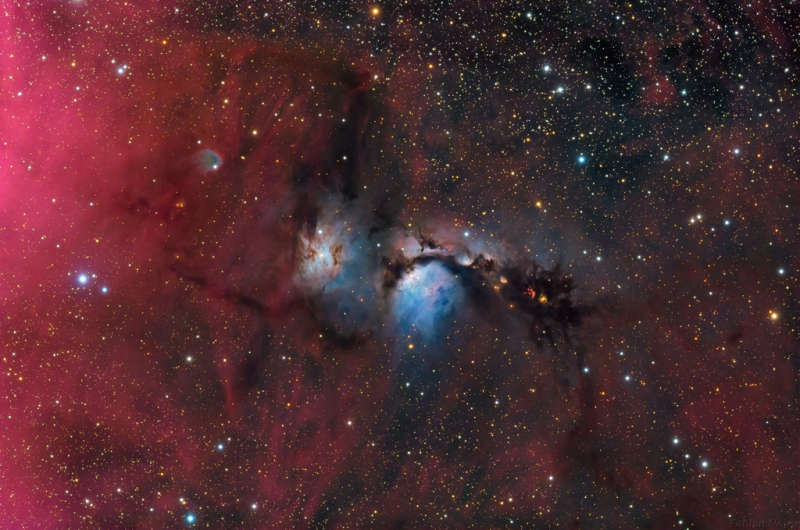
|
Credit & Copyright: Fabian Neyer
Explanation:
Interstellar
dust clouds and
glowing nebulae
abound in the fertile
constellation of Orion.
One of the
brightest, M78,
is centered in this colorful,
wide field view,
covering an area north of
Orion's belt.
At a distance of about 1,500 light-years, the
bluish reflection nebula is around 5 light-years across.
Its tint is due to dust
preferentially
reflecting the blue light
of hot, young stars.
Reflection nebula NGC 2071 is
just
to the left of M78.
To the right, and much more compact in appearance,
the intriguing McNeil's Nebula is a recently
recognized variable nebula associated with a young sun-like star.
Deeper red flecks of emission from
Herbig-Haro objects, energetic jets from stars in the process of
formation, stand out against the dark dust lanes.
The exposure also brings out the region's fainter pervasive
glow of atomic hydrogen gas.
|
January February March April May June July August September October November December |
| ||||||||||||||||||||||||||||||||||||||||||||||||
NASA Web Site Statements, Warnings, and Disclaimers
NASA Official: Jay Norris. Specific rights apply.
A service of: LHEA at NASA / GSFC
& Michigan Tech. U.
Based on Astronomy Picture
Of the Day
Publications with keywords: reflection nebula - emission nebula
Publications with words: reflection nebula - emission nebula
See also:
- Sharpless 249 and the Jellyfish Nebula
- APOD: 2026 February 2 Á Orion: The Running Man Nebula
- NGC 1333: Stellar Nursery in Perseus
- APOD: 2026 January 28 Á M78: Reflecting Blue in a Sea of Red
- NGC 7023: The Iris Nebula
- APOD: 2025 December 17 Á W5: The Soul Nebula
- APOD: 2025 December 9 Á The Heart of the Soul Nebula
